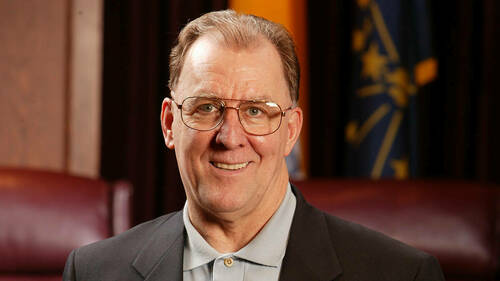
Notre Dame Law School Professor Emeritus J. Eric Smithburn — a leading scholar in family law and a compassionate advocate for disadvantaged children and families — passed away June 18. He was 76.
Smithburn joined the Notre Dame Law School faculty in 1978 after serving as a judge in Marshall County, Indiana. In addition to family law and juvenile law, his academic interests included evidence and appellate review. He was a sought-out speaker in judicial circles nationwide and wrote several highly regarded books.
He masterfully directed Notre Dame Law School’s summer program in London from 1984 to 2000. Under his leadership, the Notre Dame program attracted and enrolled students from law schools across the United States. He was also admitted as a barrister in the United Kingdom.
In addition to his responsibilities as a professor, Smithburn served as a senior judge in the St. Joseph County Probate Court and continued to serve on the bench after retiring from the law faculty in 2015.
“Notre Dame Law School has reached its current place among the nation’s best law schools in part because of the contributions of Eric Smithburn,” the Joseph A. Matson Dean and Professor of Law G. Marcus Cole said.
Colleagues described Smithburn, who stood 6-foot-4, as a big man with a big heart, big laugh and big love for family and life in general.
“I always thought of Eric as a gentle giant,” said Professor Emerita Patricia O’Hara, who served as the Law School’s dean from 1999 to 2009.
“Beneath his physical exterior, honed from years as an adult on the rugby field, was a compassion deepened by his experience as a trial court judge dealing with families and youths in crisis, as well as by his own loss of his infant son, Conner,” O’Hara said. “To enter his faculty office was to step back in time and see curios inherited from his parents that were not important to him because of their intrinsic value, but because he treasured family. Eric took deep pride in the professional reputation as a lawyer enjoyed by his wife, Aladean, and regaled colleagues with the accomplishments of his son, Scott, and his stepdaughter, Kylea.”
Professor Emeritus Fernand “Tex” Dutile said Smithburn was multidimensional.
“He loved his family, the law, athletics, music, the Lizzie Borden case and London. Surely this love of London, coupled with hard work, attention to detail and care for the richness of the students’ experience, propelled him, as director, to keep Notre Dame’s London summer law program as the very best such American program over the entire span of his 16 years’ leadership,” Dutile said. “Always cheerful, warm and ready to laugh, he enriched the faculty. He brought to us a unique perspective that was uniquely valuable.”
Professor Jay Tidmarsh also noted Smithburn’s love of the English legal system. “I recall when Eric was called to the bar of England and Wales. It was one of his proudest accomplishments: from small-town Indiana lawyer to international practice,” Tidmarsh said.
Among Smithburn’s highly regarded books were the West Indiana Practice volumes on Family Law — authoritative sources that he co-authored with South Bend attorney and Notre Dame Law graduate Ann Carol Nash.
“We spent many hours talking about life and law,” Nash said. “What impressed me most was that, while we discussed the nuances of cases and statutes, he never forgot how profoundly the law affects the people involved in family law.”
Peter Tomas Morgan was in Smithburn’s evidence course as a law student. After graduation, Morgan argued cases in front of Smithburn while the professor was serving as a probate court judge. Morgan later became executive director of the St. Joseph Probate Court/Juvenile Justice Center, where Smithburn maintained an office as a senior judge.
“I will never pass down the words, the arguments, the statements of the kind which he left behind,” Morgan said. “But as much as I value these, I value more how he has inspired me to be present to the person in front of me, whether in the courtroom, in the law office or on the street, with fairness, with respect, with a genuine belief that we can all be our better selves.”
A private burial was held for Smithburn. A celebration of his life will take place on a later date.